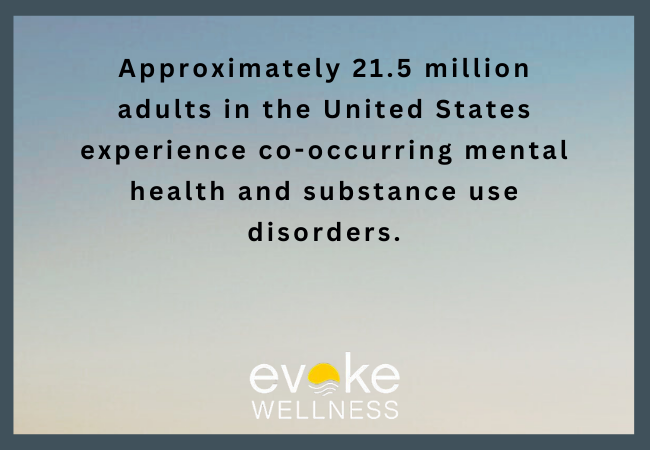Addiction and mental illness often occur together, creating a complex challenge for those seeking recovery. Many individuals struggling with substance abuse also experience mental health disorders such as depression, anxiety, PTSD, or bipolar disorder. When left untreated, these co-occurring conditions can create a cycle where one disorder worsens the other.
Behavioral health programs provide an integrated approach to treating both addiction and mental illness at the same time. At Evoke Wellness Ohio, our mental health treatment program in Ohio combines evidence-based therapies, medication management, and holistic care to ensure individuals receive comprehensive support for lasting recovery.
The Connection Between Mental Illness and Addiction
Substance abuse and mental health disorders are often deeply intertwined. This relationship is referred to as a co-occurring disorder or dual diagnosis.
Key Facts About Mental Illness and Addiction
- Nearly 50% of individuals with a substance use disorder also have a mental health condition.
- Mental illness can increase the risk of substance abuse as individuals may turn to drugs or alcohol for temporary relief.
- Substance abuse can worsen symptoms of depression, anxiety, and other psychiatric disorders.
- Without treatment, co-occurring disorders can make achieving long-term recovery more difficult.
Given this strong connection, treating both conditions together through a behavioral health program is crucial for sustained healing.
How Behavioral Health Programs Address Co-Occurring Disorders
Behavioral health programs take a comprehensive, integrated approach to treating addiction and mental illness. Instead of treating each condition separately, they address both together to ensure long-term recovery.
Comprehensive Assessment and Dual Diagnosis Evaluation
Before treatment begins, a thorough assessment is conducted to determine the extent of both the mental health disorder and substance use disorder. This evaluation helps create a personalized treatment plan tailored to the individual’s specific needs.
Evidence-Based Therapies for Addiction and Mental Health
Therapy plays a crucial role in substance abuse treatment programs in Ohio. Behavioral health programs use proven therapeutic approaches to help individuals manage mental health symptoms while addressing addiction.
Common Therapy Approaches Include:
- Cognitive behavioral therapy (CBT) helps individuals recognize and change harmful thoughts and behaviors.
- Dialectical behavior therapy (DBT) teaches emotional regulation and coping strategies for distress.
- Trauma-informed therapy helps process past trauma that may contribute to both addiction and mental illness.
- Group therapy provides peer support and shared experiences to strengthen recovery.
- Family therapy helps rebuild relationships and educate loved ones on supporting recovery.
Medication Management for Dual Diagnosis
In some cases, individuals may require medication to manage their mental health condition effectively. Medication-assisted treatment (MAT) is used when necessary to help balance brain chemistry while reducing cravings and withdrawal symptoms.
Medications may be prescribed for:
- Depression and anxiety
- Bipolar disorder
- PTSD
- Substance withdrawal symptoms
Medication is always combined with therapy and lifestyle changes to promote long-term stability.
Holistic and Wellness Approaches
Alongside traditional therapies, behavioral health programs incorporate holistic treatments to support emotional and physical well-being.
Holistic approaches may include:
- Mindfulness and meditation to improve emotional stability
- Yoga and breathing exercises to reduce stress
- Exercise and nutrition counseling to support physical health
- Art and music therapy to provide creative emotional expression
These wellness-based methods enhance overall recovery and help individuals develop healthy habits.
Why Treating Addiction and Mental Illness Together Is Essential
Attempting to treat addiction without addressing mental health—or vice versa—can lead to poor recovery outcomes. Some of the risks of failing to treat both conditions include:
- Higher relapse rates, as untreated mental health conditions can trigger substance use
- Increased psychiatric symptoms that may worsen without treatment
- Difficulty maintaining recovery, as long-term success depends on managing both conditions together
An integrated behavioral health program ensures individuals receive coordinated care to prevent relapse and support sustained well-being.
Why Choose Evoke Wellness Ohio?
At Evoke Wellness Ohio, we understand the challenges of co-occurring disorders and provide specialized treatment that addresses addiction and mental illness simultaneously. Our evidence-based programs offer a comprehensive recovery approach that supports individuals at every stage of their journey.
Our Approach to Behavioral Health Treatment
- Personalized treatment plans tailored to individual needs, ensuring both addiction and mental health are treated effectively.
- An expert clinical team of psychiatrists, therapists, and addiction specialists who provide high-quality, compassionate care.
- A dual diagnosis focus that ensures addiction and mental health disorders are treated together for the best possible outcomes.
- Evidence-based therapies such as CBT, DBT, and trauma-informed therapy to promote emotional healing and addiction recovery.
- Comprehensive aftercare and support that includes relapse prevention planning, outpatient care, and continued recovery support.
- Holistic wellness services that integrate mind-body healing, including mindfulness, nutrition counseling, and stress management techniques.
- A safe and supportive environment where individuals can focus on recovery without outside distractions.
If you or a loved one is struggling with addiction and a mental health disorder, our mental health treatment program in Ohio can provide the care and support needed for a successful recovery.
Conclusion
Treating addiction and mental illness together is essential for achieving lasting recovery and overall well-being. Behavioral health programs provide a comprehensive, integrated treatment approach that empowers individuals to regain control over their lives.
At Evoke Wellness Ohio, we are committed to helping individuals heal from addiction while managing mental health symptoms effectively. Our expert team provides individualized care designed to help individuals develop the skills and coping mechanisms needed for lifelong recovery.
Long-term success in recovery depends on treating the whole person—mentally, emotionally, and physically. Our programs are designed to help individuals rebuild their lives with confidence, teaching them how to manage triggers, develop resilience, and establish a solid foundation for sobriety. Through evidence-based treatments, compassionate support, and a structured approach to healing, we give individuals the best chance at lasting recovery. You do not have to face this journey alone. If you or a loved one is struggling with addiction and mental health challenges, Evoke Wellness Ohio is here to help. Call us today at 866.430.9267 to learn more about our behavioral health programs and substance abuse treatment programs in Ohio. Let us support you on the path to long-term recovery.
Frequently Asked Questions (FAQ)
What is a behavioral health program?
A behavioral health program is a comprehensive treatment approach that addresses both mental health disorders and substance use disorders simultaneously. It includes therapy, medication management, and holistic treatments to support long-term recovery.
Why is it important to treat addiction and mental illness together?
Addiction and mental illness often co-exist, and treating one without addressing the other can lead to relapse or worsening symptoms. An integrated approach ensures better recovery outcomes.
What types of therapies are used in behavioral health programs?
Common therapies include cognitive behavioral therapy (CBT), dialectical behavior therapy (DBT), trauma-informed therapy, group therapy, and family therapy. These approaches help individuals develop coping skills and emotional regulation.
Do behavioral health programs include medication management?
Yes, medication management is often a key component, especially for individuals with depression, anxiety, PTSD, or bipolar disorder. Medications may also be used to ease withdrawal symptoms and cravings.
What holistic treatments are available in behavioral health programs?
Holistic treatments may include mindfulness practices, yoga, nutrition counseling, exercise therapy, art and music therapy, and meditation. These approaches support overall well-being and emotional healing.
How long does treatment in a behavioral health program last?
The length of treatment varies depending on individual needs, but most programs range from 30 to 90 days, with options for ongoing outpatient care and aftercare support.



